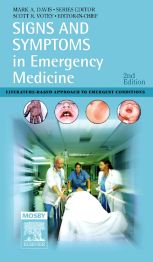Signs and Symptoms in Emergency Medicine, 2nd Edition
Current and concise, the updated and revised 2nd Edition of this pocket-sized reference reflects the substantial changes shaping the evaluation and treatment of many emergency conditions today. Its unique "signs and symptoms" approach offers the quickest possible way to diagnose critical conditions in an emergency situation. Organized around presenting symptoms, it can be used in real time to answer patient care questions. Diagnoses are listed in order of their severity in each chapter, with the symptoms, signs, suggested workup, and patient disposition given for each diagnosis.
ISBN :
9780323036450
Publication Date :
12-06-2006
Current and concise, the updated and revised 2nd Edition of this pocket-sized reference reflects the substantial changes shaping the evaluation and treatment of many emergency conditions today. Its unique "signs and symptoms" approach offers the quickest possible way to diagnose critical conditions in an emergency situation. Organized around presenting symptoms, it can be used in real time to answer patient care questions. Diagnoses are listed in order of their severity in each chapter, with the symptoms, signs, suggested workup, and patient disposition given for each diagnosis.
New to this edition
- Includes new chapters on emergency situations involving biological, chemical, and radiation terrorism • chapters devoted to the challenges presented by patients with AIDS and those with organ transplants • two chapters on environmental emergencies • one chapter examining heat illness, hypothermia, and submersion injury • and a chapter on envenomations.
- Features expanded “Treatment Considerations sections.
Key Features
- Uses a symptom-based approach for quick diagnosis.
- Features an outline format for real-time reference.
- Focuses on the 200 conditions most frequently encountered in the emergency room.
- Presents a useful tool for evaluating the likelihood that a specific symptom - or symptoms - denotes a particular disease, and allows the reader to initiate an appropriate treatment.
Author Information
By Mark A. Davis, MD, MS, Director, Institute for International Emergency Medicine and Health, Brigham and Women's Hospital, Department of Emergency Medicine, Harvard Medical School, Boston, MA; Scott R. Votey, MD, Assiatant Dean for Medical Education and Professor of Clinical Medicine, UCLA School of Medicine, Los Angeles, CA


